人教版初中英语听力
七年级英语(下)(人教版) 教材听力原文及译文
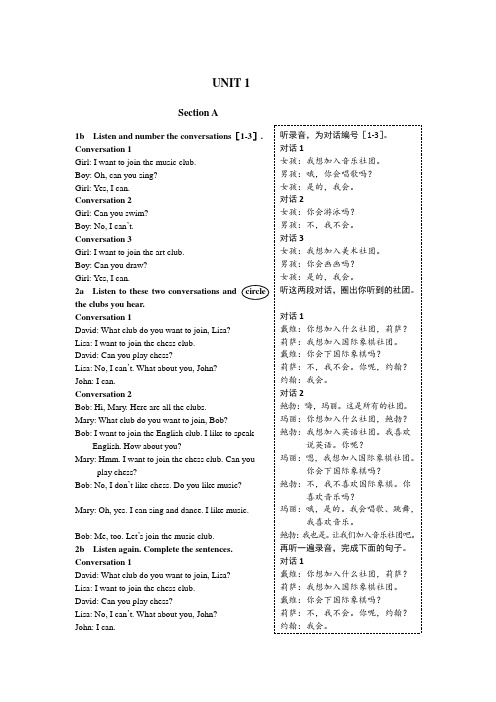
UNIT 1Section A1b Listen and number the conversations [1-3]. Conversation 1Girl: I want to join the music club. Boy: Oh, can you sing? Girl: Yes, I can. Conversation 2 Girl: Can you swim? Boy: No, I can ’t. Conversation 3Girl: I want to join the art club. Boy: Can you draw? Girl: Yes, I can.2a Listen to these two conversations and the clubs you hear. Conversation 1David: What club do you want to join, Lisa? Lisa: I want to join the chess club. David: Can you play chess?Lisa: No, I can ’t. What about you, John? John: I can. Conversation 2Bob: Hi, Mary. Here are all the clubs.Mary: What club do you want to join, Bob?Bob: I want to join the English club. I like to speakEnglish. How about you?Mary: Hmm. I want to join the chess club. Can youplay chess?Bob: No, I don ’t like chess. Do you like music?Mary: Oh, yes. I can sing and dance. I like music.Bob: Me, too. Let ’s join the music club.2b Listen again. Complete the sentences. Conversation 1David: What club do you want to join, Lisa? Lisa: I want to join the chess club. David: Can you play chess?Lisa: No, I can ’t. What about you, John? John: I can.听录音,为对话编号[1-3]。
人教版九年级英语听力
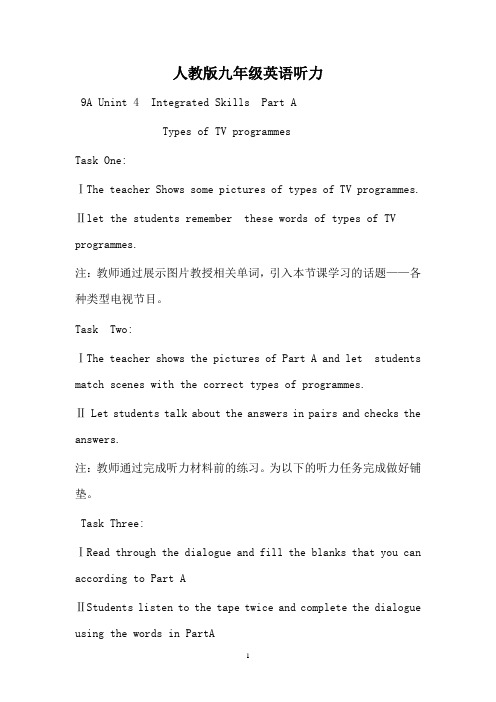
人教版九年级英语听力9A Unint 4 Integrated Skills Part ATypes of TV programmesTask One:ⅠThe teacher Shows some pictures of types of TV programmes. Ⅱlet the students remember these words of types of TV programmes.注:教师通过展示图片教授相关单词,引入本节课学习的话题——各种类型电视节目。
Task Two:ⅠThe teacher shows the pictures of Part A and let students match scenes with the correct types of programmes.ⅡLet students talk about the answers in pairs and checks the answers.注:教师通过完成听力材料前的练习。
为以下的听力任务完成做好铺垫。
Task Three:ⅠRead th rough the dialogue and fill the blanks that you can according to Part AⅡStudents listen to the tape twice and complete the dialogue using the words in PartASandy: what types of TV programmes do you like Millie? Millie:I like watching ____because I learn a lot about nature,historyand real-life events from them.Sandy: I prefer_____.I hope one day I can take part in one of them,answerall the questions and win a great prise!Daniel:I like ____because the actors in them are always very funny andthey make me laugh.Simon: If I have time I will watch a ____.There are always famous peopleon these shows talking about their lives.Amy: I love____so much.My favourite one is Hello Kitty. Andy: Do you like____? I think they are grate.They always have suchInteresting things.Sandy:Yes, but sometimes they are too long.I don't have time to sit infront of the TV for hours every night.。
八年级英语听力人教版

八年级英语听力人教版 Unit 1Section A1.What will the weather be like tomorrow? A. It will be sunny. B. It will becloudy. C. It will be rainy.2.What time does the train leave? A. 8:00 a.m. B. 9:00 a.m. C. 10:00 a.m.3.How long is the trip? A. It’s about two hours. B. It’s about three hours. C. It’sabout four hours.4.How much does the ticket cost? A. It’s $10. B. It’s $20. C. It’s $30.5.Where can I buy a ticket? A. You can buy it at the station. B. You can buy itonline. C. You can buy it over the phone.Section B1.What is the main idea of the passage? A. The benefits of reading. B. Theimportance of education. C. The power of knowledge.2.What are some of the benefits of reading? A. It can help you learn new things.B. It can help you improve your vocabulary.C. It can help you develop yourcritical thinking skills.3.Why is education important? A. It can help you get a good job. B. It can helpyou become a better citizen. C. It can help you live a more fulfilling life.4.What is the power of knowledge? A. It can help you change the world. B. Itcan help you make better decisions. C. It can help you live a happier life.5.What is the author’s purpose in writing this passage? A. To persuade peopleto read more. B. To inform people about the importance of education. C. Toinspire people to pursue knowledge.Section C1.What is the name of the speaker? A. John Smith B. Mary Jones C. David Brown2.Where does the speaker live? A. In a city B. In a town C. In a village3.What does the speaker do for a living? A. He’s a teacher. B. He’s a doc tor. C.He’s a lawyer.4.What are the speaker’s hobbies? A. He likes to read and play tennis. B. Helikes to travel and go to the movies. C. He likes to cook and listen to music. 5.What is the speaker’s favorite food? A. Pizza B. Pasta C. Sushi。
人教版七年级上册英语课文同步听力材料
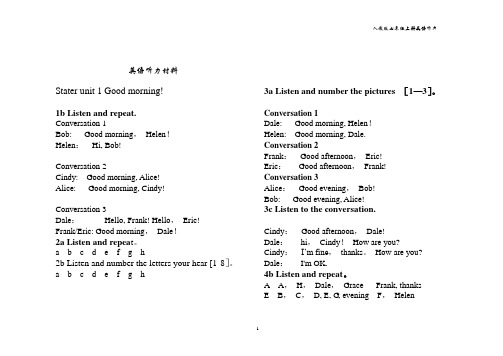
英语听力材料Stater unit 1 Good morning!1b Listen and repeat.Conversation 1Bob: Good morning,Helen!Helen:Hi, Bob!Conversation 2Cindy: Good morning, Alice!Alice: Good morning, Cindy!Conversation 3Dale:Hello, Frank! Hello,Eric!Frank/Eric: Good morning,Dale!2a Listen and repea t。
a b c d e f g h2b Listen and number the letters your hear [1-8]。
a b c d e f g h 3a Listen and number the pictures [1—3]。
Conversation 1Dale: Good morning, Helen!Helen: Good morning, Dale.Conversation 2Frank:Good afternoon,Eric!Eric:Good afternoon,Frank! Conversation 3Alice:Good evening,Bob!Bob: Good evening, Alice!3c Listen to the conversation.Cindy:Good afternoon,Dale!Dale:hi,Cindy!How are you?Cindy:I’m fine,thanks。
How are you? Dale:I'm OK.4b Listen and repeat。
A A,H,Dale,Grace Frank, thanksE B,C,D, E, G, evening F,HelenStater unit 2 What's this in English?1b Listen and repeat。
-九年级英语(上)(人教版)教材听力原文及汉语翻译
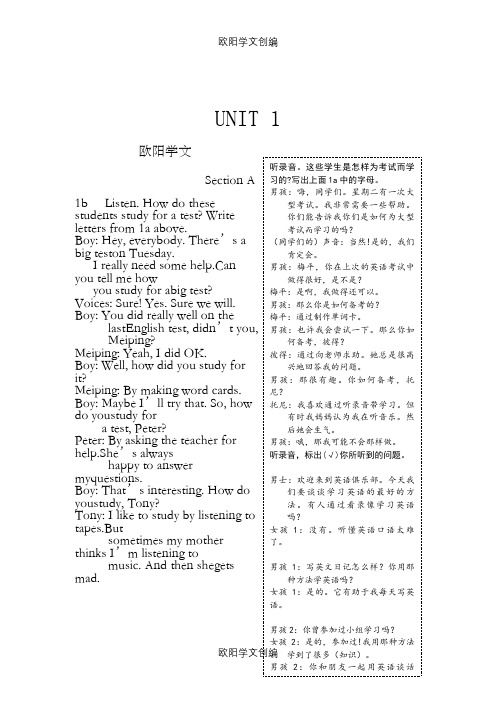
欧阳学文创编 UNIT 1欧阳学文Section A 1b Listen. How do these students study for a test? Write letters from 1a above. Boy: Hey, everybody. There’s a big teston Tuesday. I really need some help.Can you tell me how you study for abig test? Voices: Sure! Yes. Sure we will. Boy: You did really well on the lastEnglish test, didn’t you, Meiping? Meiping: Yeah, I did OK. Boy: Well, how did you study for it? Meiping: By making word cards. Boy: Maybe I’ll try that. So, how do youstudy for a test, Peter? Peter: By asking the teacher for help.She’s always happy to answer myquestions. Boy: That’s interesting. How do youstudy, Tony? Tony: I like to study by listening to tapes.But sometimes my mother thinks I’m listening to music. And then shegets mad. 听录音。
这些学生是怎样为考试而学习的?写出上面1a 中的字母。
男孩:嗨,同学们。
星期二有一次大型考试。
我非常需要一些帮助。
你们能告诉我你们是如何为大型考试而学习的吗? (同学们的)声音:当然!是的,我们肯定会。
人教版新目标七年级下初中英语听力材料Unit1
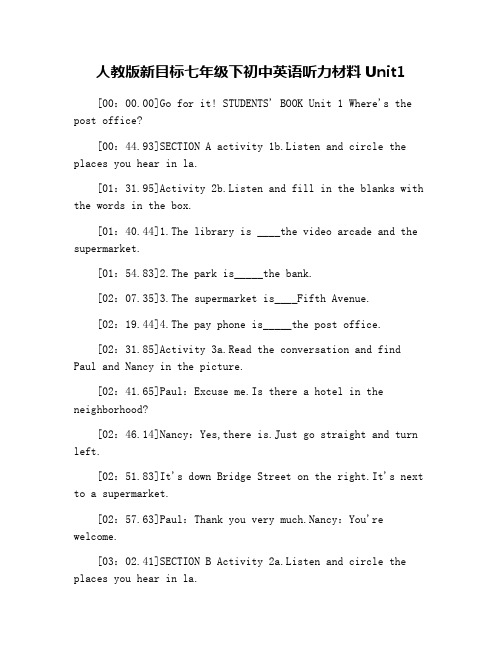
人教版新目标七年级下初中英语听力材料Unit1[00:00.00]Go for it! STUDENTS' BOOK Unit 1 Where's the post office?[00:44.93]SECTION A activity 1b.Listen and circle the places you hear in la.[01:31.95]Activity 2b.Listen and fill in the blanks with the words in the box.[01:40.44]1.The library is ____the video arcade and the supermarket.[01:54.83]2.The park is_____the bank.[02:07.35]3.The supermarket is____Fifth Avenue.[02:19.44]4.The pay phone is_____the post office.[02:31.85]Activity 3a.Read the conversation and find Paul and Nancy in the picture.[02:41.65]Paul:Excuse me.Is there a hotel in the neighborhood?[02:46.14]Nancy:Yes,there is.Just go straight and turn left.[02:51.83]It's down Bridge Street on the right.It's next to a supermarket.[02:57.63]Paul:Thank you very much.Nancy:You're welcome.[03:02.41]SECTION B Activity 2a.Listen and circle the places you hear in la.[03:51.92]Activity 2b.Listen again.Draw a map ofMichael's neighborhood in the box.[04:32.51]Activity 3a.Read the tour guide and circle the description words.[04:41.31]Welcome to the garden district.[04:45.31]Turn left off the busy First Avenue[04:50.19]and enjoy the city's quiet streets and small parks.[04:54.71]Take a walk through the park on Center Avenue.[04:58.89]Across from the park is an old hotel.[05:03.18]Next to the hotel is a small house with an interesting garden.[05:09.86]This is the beginning of the garden tour.[05:13.94]Activity 3b.Look at the picture and fill in the blanks.[05:21.83]Come to visit Bridge Street.[05:26.43]Bridge Street is a good place to have fun Itis a very___street.[05:34.03]You can play games in the___.And if you're hungry,you can buy some food in the ___.[05:43.54]It's__the post office.You can enjoy your meal on a bench in the park.It's there,between the___and___.[05:56.02]SELF CHECK Actvivity 3.You are going to visit your friend.[06:06.92]Read the e-mail from him and draw the route from the airport to his house.[06:13.50]Dear friend, I know you are arriving next Sunday.[06:19.30]Let me tell you the way to my house.Take ataxi from the airport.[06:26.90]You pass a bank on your right and then go down Long Street.[06:33.01]You go through Sixth Avenue,Seventh Avenue,and Eighth Avenue,[06:39.70]When you see a big supermarket,turn left.[06:44.79]Then go down Bridge Street and turn left at New Park.[06:49.99]Go down Center Street and my house is on your right.[06:54.77]I hope you have a good trip.Yours,Mike[07:01.96]Words and Expressions in unit 1 post[07:08.41]n.邮件,邮递[07:14.86]office[07:16.81]n.办公室;事务所[07:18.75]post office[07:21.35]post office邮局[07:23.95]arcade[07:26.11]n.拱廊;有拱廊的街道游乐中心[07:28.26]video arcade[07:31.11]电子游戏中心[07:33.96]bank[07:36.06]n.银行[07:38.16]supermarket[07:40.90]n.超市[07:43.65]phone[07:45.84]n.电话[07:48.04]pay[07:50.33]v.付钱 n.薪金[07:52.63]pay phone[07:55.39](投币式)公用电话[07:58.15]park[08:00.54]n.公园[08:02.93]avenue[08:05.33]n.大道,林荫道[08:07.73]bridge[08:09.89]n.桥[08:12.04]mail[08:14.24]n.邮政,邮件[08:16.43]near[08:18.83]prep.接近,靠近[08:21.24]across[08:23.78]prep.从(某物)的一边到另一边;横过[08:26.33]across from[08:29.04]在...的对边[08:31.74]excuse[08:34.18]v.原谅,宽恕[08:36.62]excuse me.[08:38.77]对不起[08:40.91]neighborhood[08:43.36]n.附近,临近地区[08:45.82]just[08:47.91]adv.(用于祈使句)试请;[08:50.00]straight[08:52.44]adv.径直地;直接地[08:54.88]turn[08:57.04]v.转动;旋转[08:59.19]left[09:01.58]adv.往左;向左n.左面;左边[09:03.97]right[09:06.22]adv.向右,往右[09:08.47]welcome[09:10.91]受欢迎的[09:13.35]You're welcome [09:15.40]没关系[09:17.45]dirty[09:19.50]adj.肮脏的[09:21.55]old[09:24.01]adj.旧的;老的[09:26.47]market[09:28.76]n.市场;市集[09:31.06]soda[09:33.11]n.苏打水;汽水[09:35.16]pine[09:37.61]n.松树[09:40.05]garden[09:42.60]n.花园;园子[09:45.14]district [09:47.83]n.地区;区域[09:50.52]off[09:52.91]prep.离开,远离[09:55.30]take a walk [09:57.90]散步[10:00.50]through[10:02.50]prep.穿过;经过[10:04.50]pass[10:06.89]v.经过;穿过;通过[10:09.28]house[10:11.49]n.房子;住宅[10:13.69]beginning[10:15.94]n.开始[10:18.19]tour[10:20.43]n.旅行;参观; [10:22.68]visit[10:24.89]n.游览;参观[10:27.10]fun[10:29.18]n.娱乐,乐趣; [10:31.27]have fun[10:33.47]玩得高兴;过得愉快[10:35.66]if[10:37.77]conj.假使;如果[10:39.87]you're=you are[10:43.51]你是[10:47.16]hungry[10:49.31]adj.饥饿饿[10:51.47]bench[10:53.82]n.长凳;板凳[10:56.17]arrive[10:58.52]v.到达;[11:00.87]taxi[11:03.07]n.出租车;的士[11:05.26]take a taxi[11:07.66]打的;乘出租车[11:10.07]airport[11:12.26]n.飞机场[11:14.45]yours[11:19.69]pron.(通常用在英文署名前)你的;你们的。
八年级英语下人教版教材听力原文及译文
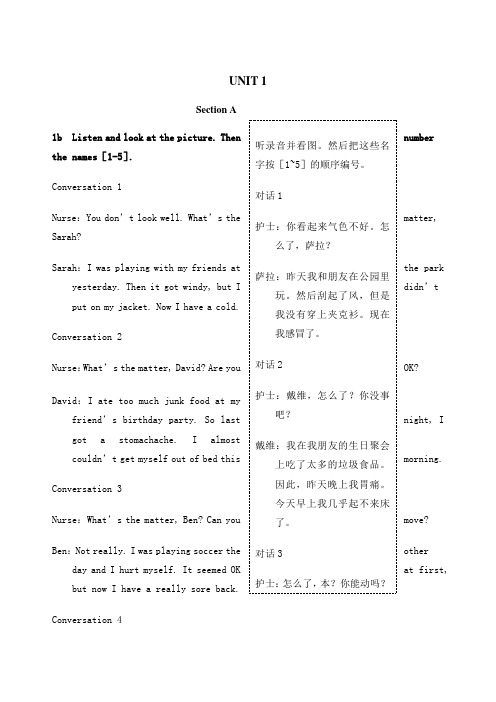
UNIT 1Section A1b Listen and look at the picture. Then numberthe names [1-5]. Conversation 1Nurse :You don ’t look well. What ’s the matter,Sarah?Sarah :I was playing with my friends atthe park yesterday. Then it got windy, but I didn ’tput on my jacket. Now I have a cold. Conversation 2Nurse :What ’s the matter, David? Are you OK?David :I ate too much junk food at myfriend ’s birthday party. So last night, Igot a stomachache. I almost couldn ’t get myself out of bed this morning.Conversation 3Nurse :What ’s the matter, Ben? Can youmove? Ben :Not really. I was playing soccer the other day and I hurt myself. It seemed OK at first,but now I have a really sore back. Conversation 4听录音并看图。
然后把这些名字按[1~5]的顺序编号。
对话1护士:你看起来气色不好。
怎么了,萨拉?萨拉:昨天我和朋友在公园里玩。
然后刮起了风,但是我没有穿上夹克衫。
现在我感冒了。
对话2 护士:戴维,怎么了?你没事吧?戴维:我在我朋友的生日聚会上吃了太多的垃圾食品。
人教版8年级初中英语听力材料
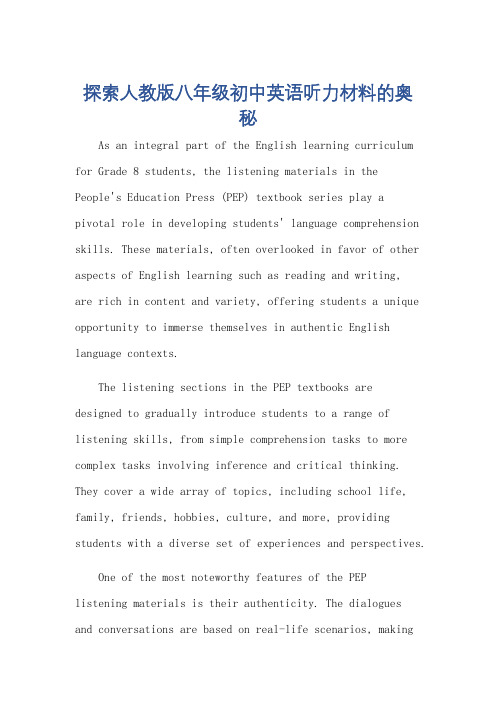
探索人教版八年级初中英语听力材料的奥秘As an integral part of the English learning curriculum for Grade 8 students, the listening materials in thePeople's Education Press (PEP) textbook series play apivotal role in developing students' language comprehension skills. These materials, often overlooked in favor of other aspects of English learning such as reading and writing,are rich in content and variety, offering students a unique opportunity to immerse themselves in authentic English language contexts.The listening sections in the PEP textbooks aredesigned to gradually introduce students to a range of listening skills, from simple comprehension tasks to more complex tasks involving inference and critical thinking. They cover a wide array of topics, including school life, family, friends, hobbies, culture, and more, providing students with a diverse set of experiences and perspectives. One of the most noteworthy features of the PEPlistening materials is their authenticity. The dialoguesand conversations are based on real-life scenarios, makingthe language more relatable and accessible to students. This authenticity also helps students to better understand and appreciate the nuances of the English language, such as informal expressions, cultural references, and idioms.Moreover, the listening materials in the PEP textbooks are designed to encourage active listening. They often include questions that require students to analyze and interpret the information presented, rather than simply recognize keywords or phrases. This approach fosters a deeper understanding of the material and helps students to develop their analytical skills.In addition to its educational value, the PEP listening materials are also highly engaging. The use of dialogues and narratives, coupled with engaging audio recordings, keeps students engaged and interested. This engagement is crucial for maintaining students' motivation and momentumin their language learning journey.However, effective utilization of these listening materials requires teachers to guide students in the right direction. Teachers should encourage students to actively participate in listening activities, such as role-playing,discussions, and debates, to help them apply the language they have learned in real-world contexts. Teachers should also provide feedback and guidance to help studentsidentify areas where they need to improve their listening skills.In conclusion, the listening materials in the PEP textbooks for Grade 8 English are an invaluable resourcefor enhancing students' language comprehension skills. By providing authentic, engaging, and diverse content, these materials prepare students for the challenges they will encounter in real-world language use. With the guidance of teachers who emphasize active listening and critical thinking, students can fully capitalize on the potential of these materials and take their English language skills to new heights.**人教版八年级初中英语听力材料的奥秘探索**作为人教版八年级英语教科书的重要组成部分,听力材料在培养学生语言理解能力方面发挥着至关重要的作用。
- 1、下载文档前请自行甄别文档内容的完整性,平台不提供额外的编辑、内容补充、找答案等附加服务。
- 2、"仅部分预览"的文档,不可在线预览部分如存在完整性等问题,可反馈申请退款(可完整预览的文档不适用该条件!)。
- 3、如文档侵犯您的权益,请联系客服反馈,我们会尽快为您处理(人工客服工作时间:9:00-18:30)。
英语课程要使学生掌握一定的英语基础知识和听、说、读、写技能,形成一定的综合语言运用能力。
听、说、读、写是学习英语的基本技能,而听的技能直接影响到其它三项技能的提高。
我分析了初中英语听力教学中的问题及影响因素,并提出了相应的实践对策。
关键词: 初中英语听力教学方法
听力是外语学习的五个技能之一,是外语学习的基础。
多年的教学现状表明:学生在英语学习上听的能力大大低于该学科的其它能力。
因此,对中学英语听力的现状进行分析,找出障碍,决定对策就显得十分必要。
我结合个人的教学实践,总结出在听力教学中影响学生听力的一些因素和问题,并提出了一些如何提高学生听力能力的实践对策。
一、初中英语听力教学存在的问题
1.只注重突击性训练,而忽视秩序渐进的规律。
在教学实际中,很多老师在英语教学中都没有根据秩序渐进的科学原理,由浅入深、由易到难、日积月累地训练学生的听力,而是到考试前才临时抱佛脚,对英语听力进行强化训练。
不管学生的基础如何,不管学生能否消化,硬往学生耳里灌。
2.只注重训练次数,而忽视事半功倍的训练方法。
在平时的教学中,很多老师就用这样或那样的听力材料一次又一次地重复操练。
没有目的,没有针对性,只注重训练的量,而没有考虑到训练方法。
结果适得其反,不但没有达到预期的效果,反而大大挫伤学生练习听力的积极性。
3.只注重训练想要的结果,而忽视必要的训练过程。
有的老师在训练听力的时候,让学生先把课文或其它的语音材料反复地熟读,甚至叫学生先背下来,有的把一个句子拆得七零八落,一个词反复播放让学生听。
其实这样做忽视了学生对于语篇的整体理解,大大降低了听力的难度和效果。
二、影响学生听力的几个因素
1.语音及基础知识障碍。
听力是听和理解的结合。
由于学生在初学阶段没有很好地掌握正确发音,缺乏一定的词汇量,辨别语法结构的能力较弱,感到听懂听力材料比较困难。
另外,学生对基础语法知识掌握得不够准确,影响到听力理解水平和反应速度。
因此,掌握一定数量的词汇的语音和基本语法就成了做好听力理解题的关键。
2.英语文化背景知识的障碍。
语言是文化的载体,英语学习者的英语文化背景知识的缺乏也会给听力带来困难。
英语学习应具备一定的英美历史、文化、风俗及语言文学知识。
英语民族的社会文化和语言习惯与中国相差很远。
因此,初中英语教师要调动学生所有的知识结构,包括语言性和非语言性的知识结构。
要注意非语言性知识对听力理解的积极意义。
培养学生的阅读兴趣,以免由于知识面不够宽广而影响学生的听力理解。
3.心理因素的障碍。
情感因素直接影响学生听力能力的形成与提高。
在经济不发达地区的学校学生在心理上都害怕听力测试,紧张、焦虑的心理伴随着整个听力测试过程。
当处在焦虑紧张的情形下时,听力理解水平可想而知。
因此,教师平时应注意培养学生的积极性和自信心。
三、提高初中英语听力的对策
1.培养学生良好的心理状态。
积极的情感态度是英语学习成功的关键。
初中英语教师应着力在“关注学生情感,营造宽松、民主、和谐的教学氛围”上下功夫,在日常教学中培养学生良好的听力心理状态、帮助学生克服焦虑和畏难情绪就显得尤为重要。
教师要明确告诉学生,听是学好英语的重要途径之一,要加以重视,但不能畏惧,对于较难的听力材料,只要正视它,经过持之以恒的训练是可以征服的。
要时时激励学生,对学生取得的点滴进步及时给予表扬。
教师应努力探索英语教学的新方法、好方法,积极开展形式多样、丰富多彩的英语学习活动,给学生营造一个好的英语学习氛围,这对培养学生的语感、提高听力水平非常重要。
2.重视语音和基础知识教学。
首先要过好语音关、词汇关、语法关,这是听力理解的基础也是关键。
比如对于单词的学习,在实际教学中,我采用根据读音记忆法,达到“听其音而知其形,观其形而识其音”。
另外,还可以采用联想记忆、对比记忆和词根记忆法,都收到了比较好的效果。
3.掌握一定听力技巧。
利用听力练习来提高听的技巧、训练审题与应变能力,是提高英语听力测试水平的有效途径。
在听力训练起始阶段,学生可以边听边做一些笔录,记录下材料中的人名、地名、时间、
PS:双击获取文档,ctrl+A,ctrl+C,然后粘贴到word即可。
未能直接提供word版本,抱歉。
